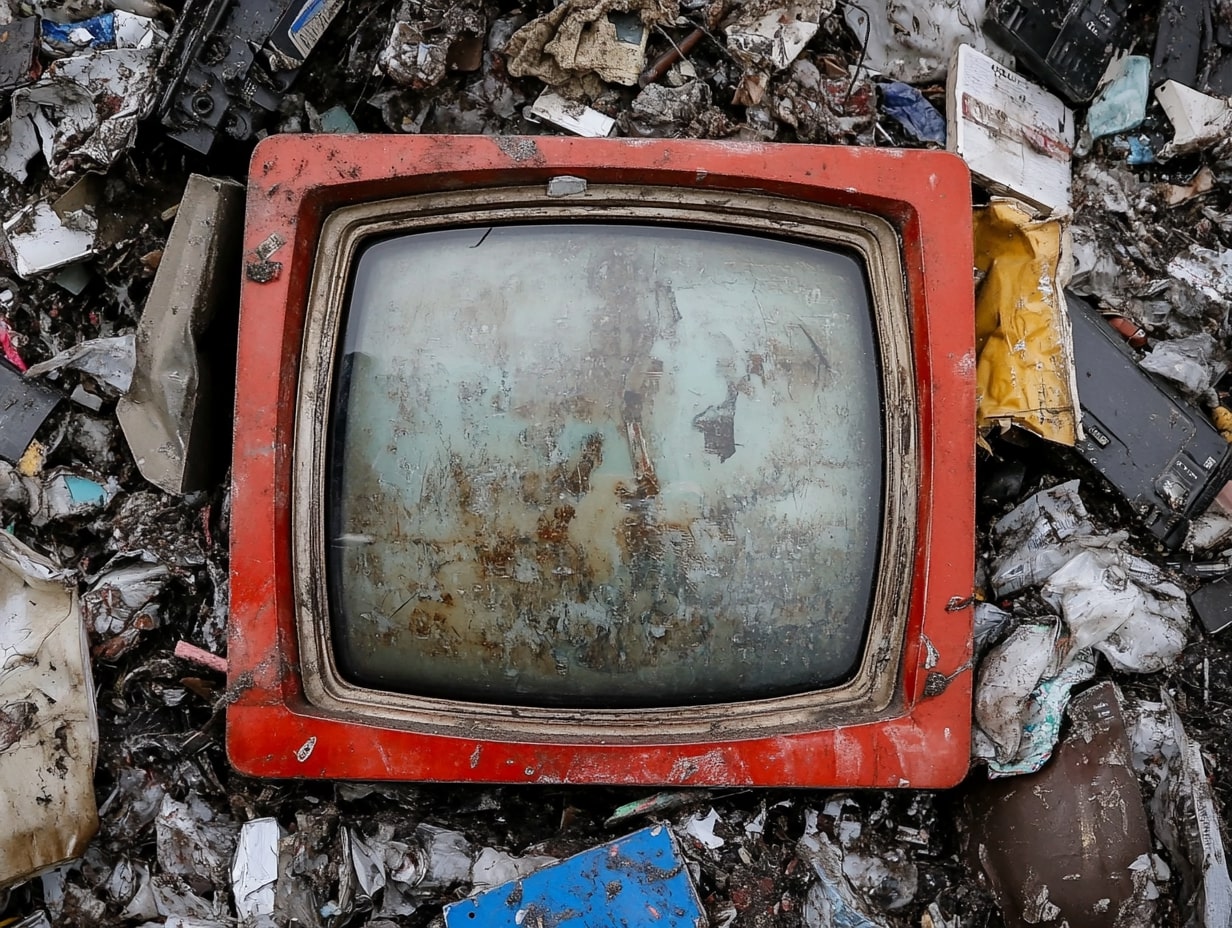We live in an era where technology evolves at lightning speed, leaving many of our electronic devices, including flatscreen TVs and other televisions, outdated or nonfunctional after just a few years. This rapid turnover generates a significant amount of electronic waste (e-waste), which poses both environmental and health risks if not disposed of properly. If you’ve ever found yourself staring at your old TV set thinking, “Can I throw this in a dumpster?” then this post is for you. Throwing a TV in the dumpster can lead to legal issues and environmental harm due to the hazardous materials they contain.
Understanding E-Waste
Before we dive into the dos and don’ts of e-waste disposal, let’s understand why tossing your old tube into the trash isn’t as harmless as it seems. Televisions contain various materials that can be harmful to the environment, such as lead, mercury, and cadmium. When thrown into landfills, these substances can leach into soil and groundwater, contaminating ecosystems and posing health risks to wildlife and humans alike.
Moreover, TVs also contain valuable components like precious metals that are worth recovering. Proper recycling ensures that these materials are extracted and reused rather than wasted.
The Disposal Dilemma
So back to the question at hand: Can you throw a television in a dumpster? In short, no – it’s typically not legal or ethical to dispose of televisions or any other electronics in dumpsters due to their hazardous components.
The Dos of E-Waste Disposal
-
Recycle Your Old TV: Many communities offer e-waste recycling programs where you can drop off your unwanted electronics for proper disposal.
-
Donate or Sell: If your TV still works but is simply outdated for your needs, consider donating it to charity or selling it online. This gives the device a second life and keeps it out of the landfill.
-
Manufacturer Take-Back Programs: Some manufacturers have programs that allow consumers to return their products for recycling at no charge.
-
Retail Drop-Offs: Certain retailers accept old TVs for recycling—sometimes even offering discounts on future purchases as an incentive.
The Don’ts of E-Waste Disposal
-
Don’t Toss It in The Trash: As tempting as it might be to put your old TV out with the weekly garbage collection, this often violates local laws aimed at reducing landfill contamination.
-
Avoid Illegal Dumping: Leaving electronics in unauthorized areas not only harms the environment but could lead to fines or legal trouble.
-
Don’t Assume All Dumpsters Are Fair Game: Even if you find an accessible dumpster, there’s no guarantee that its contents will be processed correctly for e-waste management.
Navigating Local Laws and Regulations
E-waste disposal regulations vary by location; thus, it’s crucial to check with your municipal waste management department regarding specific rules and options available in your area.
Why Proper Disposal Matters
Apart from being environmentally responsible, proper disposal is about safeguarding our future by conserving resources and preventing pollution—all while complying with laws designed to protect us all.
In conclusion, while throwing a TV into a dumpster might seem like an easy fix for getting rid of unwanted electronics quickly, it’s neither responsible nor legal in most cases. By choosing alternatives like recycling programs or donation centers instead, you contribute positively towards managing e-waste sustainably while making choices that benefit our planet—and potentially even someone else’s home entertainment system!
As we continue embracing new technologies at breakneck speeds let’s ensure that our excitement for innovation goes hand-in-hand with our commitment to environmental stewardship—one discarded television at a time!
Understanding Electronic Waste Disposal
Electronic waste disposal is a critical issue that affects the environment, human health, and the economy. Electronic waste, also known as e-waste, refers to discarded electronic devices such as computers, phones, televisions, and other electronic equipment. Improper disposal of e-waste can lead to the release of hazardous materials, including lead, mercury, and cadmium, into the environment. These materials can contaminate soil, water, and air, posing serious health risks to humans and wildlife.
What is Electronic Waste?
Electronic waste, commonly known as e-waste, refers to discarded electronic devices and components that are no longer needed or have reached the end of their useful life. This category includes a wide range of items such as computers, smartphones, televisions, refrigerators, and other household appliances. E-waste can be hazardous to both the environment and human health if not disposed of properly, as it contains toxic materials like lead, mercury, and cadmium. These hazardous substances can leach into the soil and water, causing contamination and posing serious health risks to humans and wildlife. Properly managing electronic waste is crucial to prevent these harmful effects and to recover valuable materials that can be reused.
Environmental Impact of Improper Disposal
The environmental impact of improper e-waste disposal is significant. When e-waste is sent to landfills or incinerated, it can release toxic chemicals into the environment. These chemicals can contaminate soil and groundwater, affecting plant and animal life. Additionally, the extraction and processing of raw materials for new electronic devices can lead to environmental degradation and resource depletion.
Medical waste is another type of hazardous material that requires special handling during disposal.
Items to Avoid Putting in a Dumpster
When it comes to disposing of electronic waste, it’s essential to avoid putting certain items in a dumpster. These items include:
Electronics and Appliances
-
Computers and computer components
-
Smartphones and mobile devices
-
Televisions and monitors
-
Refrigerators and freezers
-
Air conditioners and heaters
-
Washing machines and dryers
-
Dishwashers and microwaves
These items contain hazardous materials and should be disposed of through designated recycling programs or facilities. Dumping them in a regular dumpster can lead to the release of toxic substances, which can harm the environment and violate local regulations. Always opt for proper disposal methods to ensure these hazardous materials are handled safely.
Recycling Electronic Waste
Recycling electronic waste is a crucial step in reducing the environmental impact of e-waste. Recycling programs can help recover valuable materials, such as copper, gold, and silver, from e-waste. These materials can be used to manufacture new electronic devices, reducing the need for raw materials and minimizing waste. Recycling electronic waste also helps to conserve natural resources, reduce greenhouse gas emissions, and mitigate the environmental impacts of mining and processing raw materials.
Recycling Programs
Many organizations and companies offer recycling programs for electronic waste. These programs allow individuals to drop off their unwanted electronic devices at designated locations, where they will be properly recycled. Some popular recycling programs include:
-
Best Buy’s Electronics Recycling Program: Accepts a wide range of electronic devices and offers convenient drop-off locations.
-
Staples’ Electronics Recycling Program: Provides recycling services for various electronics, including computers and peripherals.
-
Goodwill’s Electronics Recycling Program: Partners with Dell to recycle electronic devices and supports job training programs.
Participating in these recycling programs helps ensure that electronic waste is processed correctly, reducing environmental impact and conserving valuable resources.
Disposal Options
There are several disposal options available for electronic waste. One option is to take e-waste to a recycling center or drop-off location. Many electronics manufacturers and retailers offer take-back programs or recycling options for their products. Additionally, some communities have designated collection events for e-waste. It is essential to check with local authorities to determine the best disposal options for e-waste in your area.
Another effective method is using dumpster rentals for disposing of large amounts of waste, including electronics, while navigating local regulations. Dumpster rentals can help ensure that materials are disposed of efficiently and in compliance with safety and local waste disposal regulations.
When disposing of electronic waste, it is crucial to follow proper procedures to ensure that hazardous materials are handled and disposed of safely. This includes removing batteries and other hazardous components, wiping data from devices, and packaging e-waste in a way that prevents damage during transportation.
In conclusion, electronic waste disposal is a critical issue that requires attention and action. By understanding the environmental impact of improper disposal, recycling electronic waste, and exploring disposal options, we can work towards reducing the environmental impacts of e-waste and promoting sustainable practices.
Recycling Center
A recycling center is a facility that accepts and processes electronic waste for recycling. These centers use specialized equipment and techniques to extract valuable materials from electronic devices, such as copper, gold, and silver. By recovering these materials, recycling centers help reduce the need for raw materials and minimize waste. Many recycling centers also offer drop-off locations where individuals can bring their electronic waste for proper disposal. Utilizing these centers ensures that e-waste is handled responsibly and contributes to a more sustainable environment.
Donation and Repurposing
Donating or repurposing electronic devices is another effective way to reduce electronic waste. Many organizations accept donations of working electronic devices, which are then refurbished and sold or given to those in need. This not only extends the life of the devices but also supports charitable causes. Repurposing electronic devices can also be a creative way to give old devices new life. For example, an old computer can be repurposed as a home server or a digital picture frame. By choosing to donate or repurpose, you help reduce the amount of electronic waste that ends up in landfills and contribute to resource conservation.
It’s essential to properly dispose of electronic waste to prevent harm to the environment and human health. By recycling, donating, or repurposing electronic devices, individuals can help reduce the environmental impact of e-waste and promote sustainable practices.


